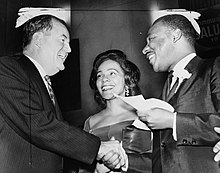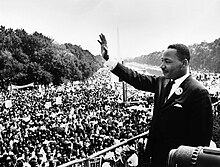Yolanda King
Appearance

Yolanda Denise King (November 17, 1955 – May 15, 2007) was an actress and activist, who appeared in numerous films and plays over the course of her life. She was the first child of Martin Luther King, Jr. and Coretta Scott King. She was the sister of Martin Luther, Dexter Scott and Bernice Albertine King.
Quotes
[edit]1960s
[edit]- Well, I wish they had built a Funtown for colored.
- Reluctantly accepting amusement park Funtown for being inaccessible to African-Americans quoted in Coretta: The Story of Coretta Scott King (2006) by Octavia B. Vivian, p. 56
- Don't tell me! Don't tell me!
- Reaction to news of father being shot quoted in Russell J. Rickford Betty Shabazz, Surviving Malcolm X: A Journey of Strength from Wife to Widow to Heroine (2003), p. 349
1970s
[edit]
- I guess people don't understand that I'm just a person.
- I think basically the youth of today are just having so many problems and they are sort of confused...This is their method, of escaping...Just like I sleep to escape my problems.
- I think blacks are definitely moving together. This is good, because in order to have any movement, you've got to have togetherness. But I also feel that because of the way society is now, we cannot get along without the white man. And the way it is now, he cannot get along without us...We've got to go to the roots of it and just change the whole society - that's why I don't believe in what some people say about having a black state and a separate black nation.
- "Yolanda King Tells of Life", Lodi News-Sentinel (January 12, 1972)
- To be perfectly honest, it has had its handicaps. The thing is that people judge you by your parents' and people expect me to be just like daddy and mother. Therefore, I can't run across the street or anything.
- I know there was so much talk in school about my daddy and people were afraid to talk to me. They thought I was stuck up. They didn't know me, had never talked to me, but just because I was Martin Luther King's daughter, I had to be stuck up and I wouldn't be able to talk to them.
- As quoted in an interview for Jet magazine (April 6, 1972).
1980s
[edit]- "I cannot separate problems happening in South Africa with problems here. I don't think you can put too much emphasis on something as brutal and overt as South Africa."
- "He created a spirit in this country that caused people to feel, at least for a little while, that there was some hope that things could be better. Needless to say, there was a percentage of the population that did not agree and thought things would be better if he were not around."
- "There have been a number of gains, a number of, I think, token results. But far too many people, both black and white, are still locked out of the system and don't have the opportunity to reach toward those goals that many of us take for granted."
- "Speaking at UC Irvine", Los Angeles Times (January 9, 1985)
- "My father had a magnificent dream, but it still is only a dream. It is easier to build monuments than make a better world. If we choose to honor him in words alone, it will be a grotesque farce."
- "These times call not for merriment only, but for movement."
- "Jim Crow is dead. But his sophisticated, college-educated, urbane first cousin J. Crow, Esquire, is alive and kicking."
- "My father was this whip who carried a bible everywhere he went, including to someone's house to dinner. That's not the kind of minister Daddy was! All these ridiculous cliches."
- In regards to her seeing a play's portrayal of her father as quoted in Manning Marable Living Black History: How Reimagining the American Past Can Remake American's Racial Future (2006), p. 133.
"A Dream Deferred" (1989)
[edit]

- It is a real thrill to be back home. When I was here I was not as endeared to this institution as I am now. You learn in retrospect and appreciate as you move on. I was indeed shaped by my experience at Smith—it was the first time I had to struggle. It was the very first time I learned how to determine and focus very specifically on the things that I felt were important, to strategize and to learn how to go about getting them and making them happen. While it was painful then, I am truly thankful for that experience now.
- We as Americans memorialize and honor symbols of heroic deeds done on the battlefields of war and violence. So should we honor those cosmic travelers who have given their lives for the struggle for peace and justice. We have thousands of monuments to men at war, at long last we have the opportunity to celebrate the life of a man of peace who was one of our own. This accomplishment is a moment of triumph—but not for Martin Luther King Jr., he wouldn’t have cared one way or other, his was a very self-effacing spirit.
- The Civil Rights Movement was not a mirage; it was not a documentary; it was not even a television special; it was live and in living color. It should not surprise us that it was a woman who sparked the movement. If Rosa Parks had not chosen to stand up that day in December 1955 by remaining seated on that bus in Montgomery, we would not be here today celebrating the life of Martin Luther King Jr. But that was the incident that propelled him into leadership and ultimately triggered the ending of segregation in the South. The doors of educational and employment opportunities were opened and blacks, Hispanics, and women of all races streamed in on an unprecedented basis.
- During the era of segregation a term was used to describe the racist separate system that was primarily intact in the South, although of course there were vestiges of it all across the rest of the country—it was called Jim Crow. Well, in 1989 I am pleased to say Jim Crow is dead, but as has been proven by incidents that happened in Forsyth County in Georgia, Howard Beach in New York, the community of Overton in Miami, just by cross burnings on college campuses, and by racial epithets being written on the walls of many of our college facilities. These incidents and so many more that are terrifying really, when we stop and think that they are still occurring in this country, point to the fact that while Jim Crow is dead his slightly more sophisticated first born son, J. Crow, Esquire, is alive and kicking. We as black people, we as women, we as humanity have not reached the promised land. We are still wandering around bumping into each other in the wilderness. The dream, that magnificent dream, pursued so fiercely by my father, is still only a dream. Racism, sexism, injustices, inequities of all shapes and sizes remain and we have to find a semblance of real peace, not the kind of peace where everything is wonderful on the surface but things are boiling underneath. I am talking about peace with justice. My father’s utterance rings persistently—either we will learn to live together as brothers and sisters or we will perish together as fools.
- He knew in 1968 that while this was a beautiful symbol of hope and possibility, it indeed was only the beginning. For after they joined hands what then were they going to do? Yes, he was dreaming again of marching on Washington, but this time the intent was to stay there not just for a day, not just for speeches and singing but to engage in a campaign of massive civil disobedience to try and stop, nonviolently, the functioning of the national government until the cause of the poor became this nation’s first priority—until all people were guaranteed a decent job, at a decent income, until we stopped the killing of Asians abroad in the Vietnam war and turned to attend to the very desperate needs of our people within our shores. That was the last dream. And if you understand that dream, if you understand that for the last six months of his life Martin Luther King Jr. was not only talking about but actively organizing native Americans, Hispanics, poor whites, blacks, people from all across this nation who had for so long been denied; if you realize how threatening that was, perhaps you will understand why the bullet came, perhaps where it came from.
- I chose to dream and act on my dreams, following the example that my father taught. To live with this dream may be crazy, it may be foolish, but to live without it would be a nightmare.
1990s
[edit]- "In time, it became increasingly apparent to me that my presence in Arizona would be misconstructed by some to be contrary to the goals and tactics of proponents of the King holiday. I believe that the greater good would be served by my support of this boycott as it represents a growing national conscience...Because of my agreement with the goals of these efforts and my wish to avoid even the appearance of any difference, however much imagined, I have decided not to appear in Arizona at this time."
- "Maybe some of this has to happen. Every year there is some outrageous act that reminds us that there is still so much work to be done."
- "And we wonder why we have problems with homelessness in our country. We wonder why we're floundering in education. We have got to take a look at reversing the priorities of this country."
- "To this day, my heart skips a beat every time I hear one of those special bulletins."
2000s
[edit]- “For some of you, the civil rights movement might seem like ancient history, but it was live, in living color.”
- “We today have that same power if we but choose it, but choose it we must. What makes each of us unique is the individual choices we make. There will always be doubters, those who prefer inaction. I have heard it all, but I am still a believer in the dream. I choose to believe.”
- “We can throw up our hands in despair, we can write off the millions that are homeless, or we can choose to believe in a different way and we can do our share to bring that world into being.”
- "Our mother is coming home and we are so grateful and so thankful that this is happening."
- "I am a 100 percent, dyed-in-the-wool, card-carrying believer in the dream."
Quotes about King
[edit]- "She lived with a lot of the trauma of our struggle. The movement was in her DNA.”


